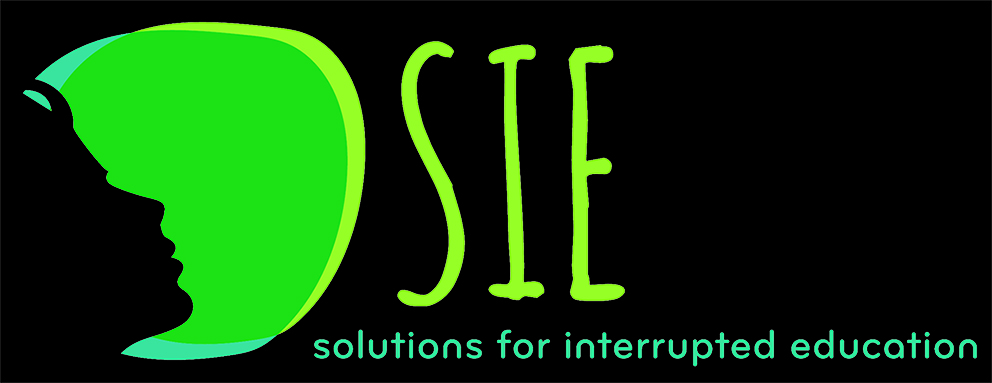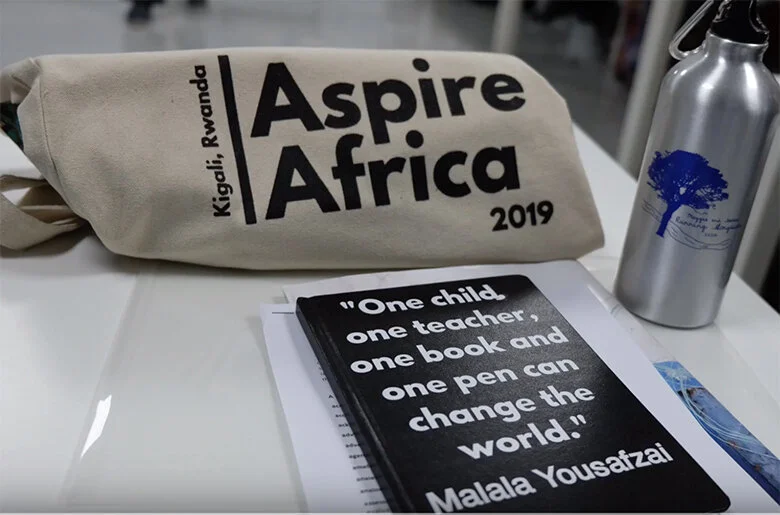THE ASPIRE PROGRAM
ASPIRE is a professional development program for teachers of refugee and immigrant students in crisis environments, designed by Solutions for Interrupted Education (SIE, Inc.) in partnership with educators, human rights activists, medical professionals and social pioneers.
ASPIRE’s long-term “teach the teachers” program is rooted in the empowering concept of Beloved Community, which fosters healing and a sense of safety, curiosity, creativity, compassion, attachment, problem solving and community transformation. The ASPIRE program provides teachers in high trauma settings with student-centered teaching methods through conferences for training, networking and sharing, as well as teacher learning circles and telementoring.
See below for the remarkable leaders who compose the ASPIRE staff.
“For teachers who have good days and bad, and whose bad days bring the suffering that comes from something one loves. It is for teachers who refuse to harden their hearts because they love learners, learning, and the teaching life.”
— Parker Palmer, The Courage to Teach
We ran experiments where you change a bunch of inputs, like changing the way the teaching happens or change the books or change the timing. And it turns out that what's really critical is that the kids should have some time when they can catch up with the material they have missed, something that is excluded from most school systems in the developing world.
~ Abhijit Banerjee and Esther Duflo, won the 2019 Nobel Prize in Economics ‘for their experimental approach to alleviating global poverty.’
ASPIRE AFRICA
SIE ASPIRE AFRICA ~ June 6-12 in Kigali, Rwanda. Our first international teachers training conference was a huge success!
SIE teamed up with the Dr. Hawa Abdi Foundation and Dr. Deqo Mohamed to create ASPIRE AFRICA, a groundbreaking conference for teachers working in partner schools in Somalia, South Sudan, the Congo, Rwanda, and Uganda.
As teachers, we all understood one another from the first moment, because we know the common hardships we face.
Thanks to your support, we provided teachers working in poverty and crisis environments with:
· An introduction to the values and practices of a Beloved Community classroom.
· An understanding of the impact of trauma on learning.
· Tools and methods to create a student-centered, healing and learning community.
· A human rights curriculum with a problem/solution approach to empowering students.
On your next visit to our school, I promise it will not be the same as when you left.
THE ASPIRE TEAM
We are educators, medical professionals, social activists and community volunteers with decades of experience in refugee education. Many of us are cofounders and/or sustainers of the International Community School, the Global Village Project for refugee girls, and a Saturday School for refugee students ages 5 to 75, in Decatur, GA.
The ASPIRE program is led by academic coordinators, Dr. Rhina Fernandes Williams of Georgia State University and Maggie Deaton, a teacher facilitator at the Rollins Center for Language and Learning in Atlanta. ASPIRE also includes a human rights curriculum developed by Deqo Mohamed, MD, and students at Yale University Law School, with a problem/solution approach to empowering students.
Deqo Mohamed, MD, is a doctor, educator and social entrepreneur. As the CEO of the Dr. Hawa Abdi Foundation, she works to develop models of sustainability in healthcare, education, food security, clean water, solar energy and alternative housing materials in Somalia and the surrounding region. Since she was a teenager, Deqo has assisted her mother, Nobel Peace Prize nominee Dr. Hawa Abdi, to provide essential services to displaced Somalis. She was a Yale Greenberg World Fellow in 2016.
Barbara R. Thompson, SIE Director, has more than twenty-five years of experience working with refugee families in crisis. She was a cofounder of the International Community School (a charter school for refugee and local children), the Saturday School for refugee children and their families, and the Global Village Project in Decatur, Georgia, for refugee teenage girls. She is an award-winning writer and editor, specializing in well-researched approaches to social issues. She was awarded the Christopher Award for media affirming “the highest values of the human spirit.”
Rhina Fernandes Williams PhD, Academic Coordinator, is a faculty member in the Department of Early Childhood and Elementary Education at Georgia State University. Her work as an elementary school teacher, professor and community member revolves around social justice and the belief in the power of critically conscious teachers. She specializes in critical pedagogy and multicultural education and works with in-service and preservice teachers in graduate and undergraduate programs. She is also an affiliated faculty with the Alonzo A. Crim Center for Urban Educational Excellence and has served on the board for the International Community School. Her publications include In the Service of Learning & Empowerment.
Maggie Deaton, Academic Coordinator, is the lead facilitator for the Dual Language Learners Program at the Rollins Center for Language and Literacy of the Atlanta Speech School, where she coaches and trains early childhood educators. She is a graduate of Rhodes College, taught with Teach for America, and has an MA in teaching from GSU. She is a former teacher at the International Community School and serves on the board.
Charlotte Finegold, Human Rights Coordinator, is the Community Human Rights Fellow at the Schell Center for International Human Rights at Yale Law School and the Communications & Development Director for the Dr. Hawa Abdi Foundation. She supervises the Hope Village Human Rights & Conflict Resolution Curriculum, a four-year program designed by Yale students to teach high school students how to become change-makers. Charlotte is a graduate of Yale, where she studied literature and human rights.
Rebekah Pleasant-Patterson, Project Director and Conference Coordinator, came to us with a rich history in the arts and events planning for business conferences, concerts, weddings and social gatherings of all kinds. With a BFA in Dance Performance and Movement Composition from the University of North Carolina School of the Arts, she brings her artistic talent into the choreographing of logistics, personnel and events for the ASPIRE conferences and programs. Just as importantly, Rebekah’s work-spirit and attention to creative detail brings a vital sense of warmth and welcoming to our conferences.
Luther E. Smith, Jr. PhD, is Professor Emeritus of Church and Community at the Candler School of Theology of Emory University. He is a founder of the Interfaith Children’s Movement in Atlanta, Georgia and speaks frequently in the US and internationally on topics such as the Beloved Community and the vision of Howard Thurman. He has made numerous television and radio appearances to discuss issues of race, religion and social change. Dr. Smith is an ordained minister in the Christian Methodist Episcopal Church and on the faculty of the Academy for Spiritual Foundation.
Rhoda Lapp has taught ESOL for more than 20 years, and served as a Fulbright exchange teacher in Morocco. After retiring from a public school system, she has focused on adult education English classes and students who need to improve reading and writing skills to gain admission to technical schools, colleges or graduate programs. Her students include those who have never been to school and medical doctors, accountants and lawyers. She also assists refugee and immigrant students to prepare for citizenship and is the ESOL teacher for SIE’s ASPIRE AFRICA. program.
Roberta Weisman Malavenda is Executive Director of CDF Action, working to connect, collaborate and transform the Clarkston community. As a local and national consultant, she has spent decades developing and implementing early learning programs with the Annie E. Casey Foundation and the Ford Foundation. She helped establish the first Latino family child care center in Atlanta and founded the Georgia Parents as Teachers (PAT) Network. She is also the director of a W.K. Kellogg grant for family engagement and early learning.
Suchita A. Patel, DO, MPH, is a physician trained in Preventive Medicine and Public Health. She has worked at the CDC since 2005 on immunization-related program planning, implementation, research, and evaluation projects as well as emergency response work including the 2009 influenza pandemic. She has served as the lead for immunization program evaluation and trained over 400 state and local public health staff in how to conduct program evaluation.














